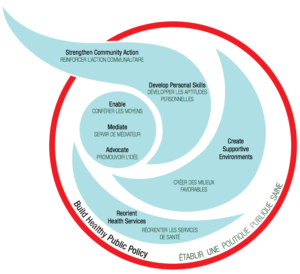About the Conference
Health Promotion ~ At the Very Heart of Sustainability
The goal of the 6th Global Forum on Health Promotion is to highlight the ways in which Health Promotion and Civil Society can contribute to the achievement of the United Nations Sustainable Development Goals. These 17 goals were adopted by world leaders during the United Nations Sustainable Development Summit in 2015, as a means to end poverty, fight inequality and injustice, and tackle climate change by 2030. In this period of global transition, health promotion is integral to creating the new sustainability paradigm. The Forum will focus on how health promotion activities can support the achievement of the Sustainable Development Goals over the next 14 years, revealing how communities and organizations around the world are creating change for local, national and global impact.

Objectives:
- To identify the achievements of Health Promotion in relation to the Ottawa Charter over the past 30 years.
- To highlight civil society activities and initiatives in Health Promotion over the past 30 years.
- To strengthen the link between the Determinants of Health, Health Promotion and the United Nations Sustainable Development Goals.
- To discuss the ways in which Health Promotion and Civil Society can contribute to the achievement of the United Nations Sustainable Development Goals, and foster the development of the new leadership in Health Promotion.
- To produce a declaration – a call to action – for increased investment by governments in health promotion and increased collaboration with civil society, as viable strategies to achieve sustainable development.
Context
The First International Conference on Health Promotion was held in Ottawa in November 1986 by the World Health Organization (WHO). At this event, the Ottawa Charter for Health Promotion was developed and adopted. The Charter identifies 5 key areas of health promotion:
- Build Healthy Public Policy
- Create Supportive Environments
- Strengthen Community Actions
- Develop Personal Skills
- Reorient Health Services
Since then, seven other international conferences on health promotion have been organized by the WHO on various topics; followed by other declarations on health promotion.
The next international conference will be held in Shanghai, China November 21-25, 2016 (WHO Global Conference on Health Promotion 9GCHP). For more information, visit: http://www.who.int/healthpromotion/conferences/en/
The Global Forum on Health Promotion is an initiative organized by the Alliance for Health Promotion, an international non-governmental organization (NGO), with a mission to strengthen global efforts to improve health by bridging the gap between international declarations and local realities; catalyzing and galvanizing NGOs’ health promotion actions and advocating for a holistic approach to health. The first Global Forum organized by the Alliance in Geneva celebrated the 25th Anniversary of the Ottawa Charter in 2011 – From Local Knowledge to Health in All Policies. Since then, it has become an annual event in Geneva providing a platform for the Alliance members and leading players in health promotion from NGOs, civil society organizations, governments, academia, international organizations and private sector to share knowledge and build partnerships.
Additional information on previous Global Forums on Health Promotion can be found at http://www.alliance4healthpromotion.org/?q=activities
“Health Promotion is the process of enabling people to increase control over, and to improve, their health.”
Key Terms
To support a common understanding of the key concepts of the Global Forum, the following definitions are provided:
“Health Promotion is the process of enabling people to increase control over, and to improve, their health.” 1 Dennis Raphael expands on that definition – “Health promotion provides a framework for efforts to improve the quality of life of individuals, communities, and societies by applying a wide range of activities and approaches to achieve desired outcomes. It is also about citizen engagement, an important part of how democratic processes can improve quality of life.” 2
The World Bank defines civil society as “the wide array of non-governmental and not-for-profit organizations that have a presence in public life, expressing the interests and values of their members or others, based on ethical, cultural, political, scientific, religious or philanthropic considerations. Civil Society Organizations therefore refer to a wide of array of organizations: community groups, non-governmental organizations, labor unions, indigenous groups, charitable organizations, faith-based organizations, professional associations, and foundations.” 3
Notes
1– World Health Organization. Health Promotion. [Online] 2016. [Cited: April 5, 2016.] http://www.who.int/topics/health_promotion/en/
2– Raphael, D. Health Promotion and Quality of Life in Canada. 1st ed. Toronto, Ontario: Canadian Scholars’ Press Inc; 2010.
3– The World Bank. Defining Civil Society. [Online] July 22, 2013. [Cited: April 5, 2016.] http://web.worldbank.org/WBSITE/EXTERNAL/TOPICS/CSO/0,,contentMDK:20101499~menuPK:244752~pagePK:220503~piPK:220476~theSitePK:228717,00.html
